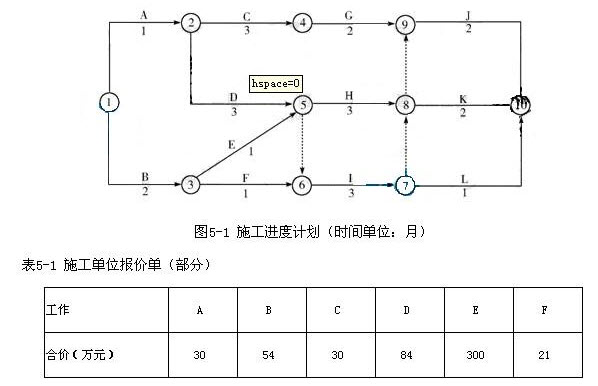五、某工程,建设单位与施工单位按照《建设工程施工合同(示范文本)》签订了施工合同,合同工期9个月,合同价840万元,各项工作均按最早时间安排且均匀速施工,经项目监理机构批准的施工进度计划如图5-1所示(时间单位:月),施工单位的报价单(部分)见表5-1.施工合同中约定:预付款按合同价的20%支付,工程款付至合同价的50%时开始扣回预付款,3个月内平均扣回;质量保修金为合同价的5%,从第1个月开始,按月应付款的10%扣留,扣足为止。
 工程于2006年4月1日开工。施工过程中发生了如下事件: 事件1:建设单位接到政府安全管理部门将于7月份对工程现场进行安全施工大检查的通知后,要求施工单位结合现场安全施工状况进行自查,对存在的问题进行整改。施工单位进行了自查整改,向项目监理机构递交了整改报告,同时要求建设单位支付为迎接检查进行整改所发生的2. 8万元费用。 事件2:现场浇筑的混凝土楼板出现多条裂缝,经有资质的检测单位检测分析,认定是商品混凝土质量问题。对此,施工单位认为混凝土厂家是建设单位推荐的,建设单位负有推荐不当的责任,应分担检测费用。 事件3:K工作施工中,施工单位按设计文件建议的施工工艺难以施工,故向建设单位书面提出了工程变更的请求。 问题:
工程于2006年4月1日开工。施工过程中发生了如下事件: 事件1:建设单位接到政府安全管理部门将于7月份对工程现场进行安全施工大检查的通知后,要求施工单位结合现场安全施工状况进行自查,对存在的问题进行整改。施工单位进行了自查整改,向项目监理机构递交了整改报告,同时要求建设单位支付为迎接检查进行整改所发生的2. 8万元费用。 事件2:现场浇筑的混凝土楼板出现多条裂缝,经有资质的检测单位检测分析,认定是商品混凝土质量问题。对此,施工单位认为混凝土厂家是建设单位推荐的,建设单位负有推荐不当的责任,应分担检测费用。 事件3:K工作施工中,施工单位按设计文件建议的施工工艺难以施工,故向建设单位书面提出了工程变更的请求。 问题:
批准的施工进度计划中有几条关键线路?列出这些关键线路。
参考答案:
4条。 关键线路:A→D→H→K(或:①→②→⑤→⑧→⑩); A→D→H→J (或:①→②→⑤→⑧→⑨→⑩) ; A→D→I→K (或:①→②→⑤→⑥→⑦→⑧→⑩; A→D→I→J (或:①→②→⑤→⑧→⑦→⑧→⑨→⑩)。
